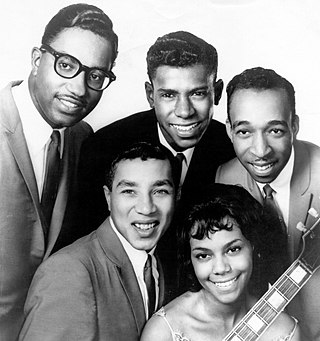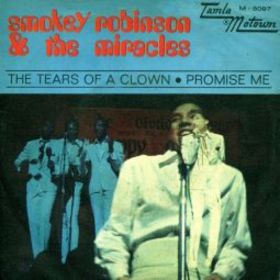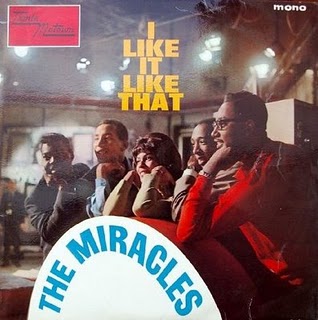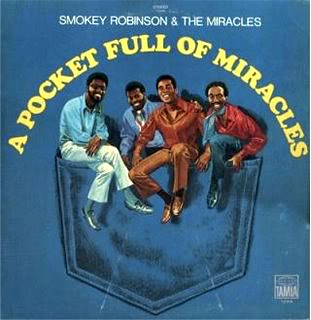Related Research Articles

William "Smokey" Robinson Jr. is an American singer, songwriter, record producer, and former record executive director. He was the founder and front man of the Motown vocal group the Miracles, for which he was also chief songwriter and producer. He led the group from its 1955 origins as "the Five Chimes" until 1972, when he announced his retirement from the group to focus on his role as Motown's vice president. However, Robinson returned to the music industry as a solo artist the following year. Robinson left Motown Records in 1990, following the sale of the company two years earlier.

The Miracles were an American vocal group that was the first successful recording act for Berry Gordy's Motown Records, and one of the most important and most influential groups in pop, rock and roll, soul and R&B music history.

"The Tears of a Clown" is a song written by Hank Cosby, Smokey Robinson, and Stevie Wonder and originally recorded by Smokey Robinson & the Miracles for the Tamla Records label subsidiary of Motown, first appearing on the 1967 album Make It Happen. It was re-released in the United Kingdom as a single in July 1970, and it became a #1 hit on the UK Singles Chart for the week ending 12 September 1970. Subsequently, Motown released "The Tears of a Clown" as a single in the United States as well, where it quickly became a #1 hit on both the Billboard Hot 100 and R&B Singles charts.

"Ooo Baby Baby" is a song written by Smokey Robinson and Pete Moore. It is a classic 1965 hit single by The Miracles for the Tamla (Motown) label. The song has inspired numerous other cover versions by other artists over the years, including covers by Ella Fitzgerald, Todd Rundgren, The Escorts, The Five Stairsteps, Linda Ronstadt, and many others. The Miracles' original version of "Ooo Baby Baby" is listed as number 266 on Rolling Stone Magazine's list of "The 500 Greatest Songs of All Time".

Away We a Go-Go is a 1966 album by Smokey Robinson & the Miracles. The album features the singles "(Come 'Round Here) I'm the One You Need", a Billboard top 20 Pop hit, written and produced by Holland-Dozier-Holland; and "Whole Lot of Shakin' in My Heart ", written and produced by Frank Wilson. The album uses a different take of "I'm the One You Need" than what was issued on the single. A third single was planned for release from this album, the tune "More, More, More ", cataloged as Tamla T-54005, but the single was never released. It was later covered by the regional group Bob Brady and The Con Chords. Another single from this album, the Stevie Wonder/Ivy Jo Hunter composition of "Can You Love a Poor Boy", was released to radio stations as a special Disc Jockey Advanced Single, Tamla T-540, but was never given an official catalog number for general release. It too, inspired cover versions by Gil Bernal and Ronnie Walker.

Greatest Hits, Vol. 2 is the second greatest hits album for The Miracles, released in 1968 on Motown Records' Tamla label. It contained the most popular singles from the successful Going to a Go-Go, Away We A Go-Go and Make It Happen albums of the 1965–1967 period. It also featured the 1964 non-album single "Come On Do The Jerk", and two B-sides, "Choosey Beggar" and "Save Me". The hit single "I Second That Emotion" was new to album. This album reached the Top 10 on the Billboard 200 albums chart, peaking at #7, and peaked at #2 on Billboard's R&B album chart. Ten of the albums' 12 songs were written by Miracles members Smokey Robinson, Pete Moore, Marv Tarplin, Bobby Rogers, and Ronnie White.
"If You Can Want" is a 1968 single recorded by R&B group Smokey Robinson & the Miracles for Motown Records' Tamla label. Written and produced by Miracles lead singer Smokey Robinson, "If You Can Want" was the most successful of the three singles included on the group's 1968 album Special Occasion. This single just missed the U.S. Top 10, peaking at number 11 on the Billboard Hot 100 in the United States, and was a Top 5 R&B hit, peaking at number three on Billboard's R&B singles chart, and was also a minor hit in England, peaking at number 50 on the United Kingdom singles chart.
"Mickey's Monkey" is a 1963 song recorded by the R&B group the Miracles on Motown Records' Tamla label. It was written and produced by Motown's main songwriting team of Brian Holland, Lamont Dozier, and Eddie Holland, who later went on to write two more Miracles hit singles, the Top 40 "I Gotta Dance to Keep From Crying", and the Top 20 "(Come 'Round Here) I'm The One You Need". This was unusual, as most Miracles songs were composed by the group members themselves.

"I'll Try Something New" is a song written by Smokey Robinson and originally released in 1962 by The Miracles on Motown Records' Tamla subsidiary label. Their version was a Billboard Top 40 hit, peaking at #39, and just missed the Top 10 of its R&B chart, peaking at #11. The song was released later as a joint single by Diana Ross & the Supremes and The Temptations, also becoming a charting version on the Billboard 100 pop singles chart, peaking for two weeks in April 1969 at number 25.
"Way Over There" is a 1960 Motown soul song and single, written by William "Smokey" Robinson, produced by Berry Gordy, and first performed by The Miracles for the Tamla (Motown) label. It was one of The Miracles' earliest charting singles, reaching #94 on the Billboard Pop chart. Motown president Berry Gordy, Jr. had The Miracles record the song several times during its chart run. The first version had minimal orchestration. The second version added strings, and this is the version played by most oldies stations today. Claudette Robinson had several lead parts on this song, answering Smokey's leads with chants of "Come to me, Baby". The song's B-side, "(You Can) Depend on Me", while not charting nationally, did become a popular regional hit in many areas of the country, and Smokey still sings it in his live shows today. "Way Over There" has inspired cover versions by Edwin Starr, The Temptations, The Marvelettes, The Royal Counts, The Spitballs, and Eddie Adams Jr, while "(You Can) Depend on Me" has inspired cover versions by The Temptations, The Supremes, Mary Wells, and Brenda Holloway. The song was also used for the title of Hip-O Select's 2009 compilation: The Miracles – Depend on Me: The Early Albums, which collects the first five LP releases by the group.
"I Like It Like That" was a 1964 hit song by Motown group The Miracles on its Tamla label subsidiary. This is not the Chris Kenner hit song of the same name but, rather, a Miracles original, written by Miracles members Smokey Robinson and Marv Tarplin, and is included on the group's first greatest hits album, Greatest Hits from the Beginning. It was also the title song from their long-since deleted 1964 album of the same name.
"I Gotta Dance to Keep from Crying" is a 1963 hit by the Miracles on Motown's Tamla label. It was written and produced by Motown's main songwriting team, Brian Holland, Lamont Dozier, and Eddie Holland.
Motown Chartbusters is a series of compilation albums first released by EMI under licence on the Tamla Motown label in Britain. In total, 12 editions were released in the UK between 1967 and 1982. Volumes 1 and 2 were originally called British Motown Chartbusters; after this the title Motown Chartbusters was used.
"Whole Lot Of Shakin' In My Heart (Since I Met You)" is a 1966 R&B song by Motown Records group The Miracles, issued on Motown's Tamla Records subsidiary. Written by Motown staff songwriter Frank Wilson, it was one of only two singles the group released in 1966, taken from their album Away We A Go-Go.

I Like It Like That is an album by Motown group the Miracles, compiled for the UK market and released on the UK Tamla-Motown label as one of its initial group of six albums in March 1965. There was no equivalent album to this in the USA. It is known as the Miracles' "forgotten album".
"Everybody's Gotta Pay Some Dues", was a 1961 R&B song by Motown Records group The Miracles released on the label's Tamla Records subsidiary. It was taken from Cookin' with The Miracles, the group's second album, and was written by Miracles members Smokey Robinson and Ronald White. It entered the Billboard Pop and R&B listings that year, and reached #52 and #11 respectively.
"Point It Out" is a 1969 recording by Motown Records R&B group The Miracles on that label's Tamla subsidiary. This mid-tempo song was a national Billboard Top 40 Pop hit, reaching #37 on the Hot 100, and was a Top 10 R&B hit was well, reaching #4. It was taken from their album "A Pocket Full Of Miracles", and was written by Miracles members William "Smokey" Robinson and Marv Tarplin, along with Motown staff songwriter Al Cleveland.

A Pocket Full of Miracles (TS306) is a 1970 album by Motown Records R&B group The Miracles, issued on its Tamla subsidiary label, one of three albums the group released that year. This album charted at #56 on the Billboard pop albums chart, and reached the top ten of the magazine's R&B albums chart, peaking at #10. It was released on September 30 of that year. Hit singles on the album included "Point It Out" and the topical Ashford & Simpson written-and-produced song "Who's Gonna Take the Blame", a sad, dark song about a girl that is turned out as a prostitute. Also included is the charting flip side "Darling Dear", B-side of "Point It Out", which reached #100 on the Billboard pop chart, and spawned a cover version by The Jackson Five.
We've Come Too Far to End It Now was a 1972 single by Motown Records R&B group The Miracles on its Tamla Label subsidiary (T54220F) and taken from their 1972 album, Flying High Together, the group's final studio album with original lead singer Smokey Robinson. This song charted at #46 on the Billboard Pop Chart, and reached the Top 10 of its R&B chart, peaking at #9.
"A Love She Can Count On" is a 1963 hit single by Motown Records R&B group the Miracles, issued on that label's Tamla subsidiary label. It was taken from their album The Fabulous Miracles, and was the follow-up to the group's million-selling Grammy Hall of Fame inducted tune, "You've Really Got A Hold On Me". The first of three singles released by The Miracles that year, this song was a Billboard Top 40 Pop Hit, peaking at number 31, and missed the Top 20 of its R&B chart by only one position, peaking at number 21.
References
- ↑ "secondhandsongs.com". secondhandsongs.com. Archived from the original on August 19, 2013. Retrieved December 29, 2020.
- ↑ The drunkenness of things being various: The Miracles - Come 'Round Here I'm The One You Need (1966/ No. 13/ 11 weeks/ Motown)
- ↑ Whitburn, Joel (2004). Top R&B/Hip-Hop Singles: 1942-2004. Record Research. p. 404.
- ↑ "officialcharts.com". officialcharts.com. Retrieved December 29, 2020.
- ↑ SOULMAN5501 (2014-03-20), SMOKEY ROBINSON & THE MIRACLES - NON SONO QUELLO CHE TU VOI, archived from the original on 2021-12-21, retrieved 2018-08-24
- ↑ "YouTube - The Miracles - (Come 'Round Here) I'm the One You Need". YouTube . Archived from the original on 2016-05-20. Retrieved 2009-08-15.